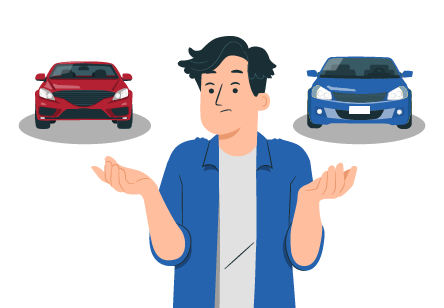Liability coverage is the basic type of car insurance. It will pay for medical bills or property damage to another driver if you are at fault up to your auto policy limits.
Common types of car insurance coverage, such as comprehensive and collision, will pay for repairs or replacement of your vehicle regardless of fault.
Uninsured and underinsured motorist coverage will pay for injuries or property damage caused by a driver without enough insurance. Other types of car insurance coverage can also be added to add extra protection.
1. Liability Coverage
Liability coverage protects you when you hurt others, including bodily injury and property damage. This type of car insurance coverage will pay for another person's medical bills, vehicle repairs, or other property damages from the accident.
Most states have minimum requirements for auto insurance coverage, so drivers have a base level of financial responsibility. Choosing enough liability insurance will minimize out-of-pocket expenses in the event of a claim. Pay a little more now, and you'll pay a lot less later.
Auto Liability Coverage has two parts: Bodily Injury Liability and Property Damage Liability. Details about both types of coverage are listed below.
Bodily Injury Liability Coverage: This covers medical expenses, lost wages, and legal fees for the people injured in an accident you caused.
Property Damage Liability Coverage: Pays for damage to someone else's property. This damage could be their vehicle, a fence, or building, due to an at-fault accident.
2. Collision Coverage
Collision coverage pays for your vehicle to be repaired if you have a collision. It doesn't matter who the at-fault driver is. It covers repairs to your car after you pay the car insurance deductible.
Collision Coverage applies if you hit another driver, no matter who's at fault. It also applies if no other vehicle is involved, for example, if you hit a tree, a mailbox, or another stationary object.
This type of auto insurance coverage fixes your vehicle, not medical costs, lost wages, or anything else beyond vehicle damage.
3. Comprehensive Coverage
Comprehensive coverage helps pay for repairing or replacing a vehicle when damage occurs from non-collision incidents such as theft, vandalism, or natural disasters.
Comprehensive insurance covers non-collision-related incidents such as theft, vandalism, natural disasters, falling objects, and animal encounters. Like collision insurance, it's optional but may be required by your lender or leasing company.
Comprehensive coverage covers the unpredictable. As any seasoned driver knows, you should always expect the unexpected. Collision and comprehensive car insurance are usually combined into physical damage coverage or "full coverage."
4. Personal Injury Protection (PIP)
Personal Injury Protection or "no-fault" insurance covers medical expenses for you and your passengers regardless of who caused the accident. PIP also covers other injuries-related expenditures, such as medical bills, lost wages, and childcare expenses. It's required in some states and optional in others.
While it's similar to MedPay, PIP offers more coverage by paying for:
Lost wages - If your injuries prevent you from working.
Rehabilitation - Physical therapy or occupational therapy if needed for recovery.
Funeral expenses - Funeral costs if the accident is fatal, so your family doesn't have to.
5. Uninsured/Underinsured Motorist Coverage
Uninsured Motorist Coverage protects you if you're involved in an accident with an uninsured driver or do not have enough insurance to cover the damages.
Underinsured Motorist Coverage protects you from an underinsured driver if their liability limits are not high enough to pay the damages in an accident they cause.
Uninsured motorist bodily injury coverage (UMBI) pays medical bills from an accident with an uninsured driver.
Uninsured motorist property damage coverage (UMPD) pays for repairs to your vehicle from an accident with an uninsured driver.
Underinsured motorist bodily injury coverage (UIMBI) pays for medical expenses that exceed the at-fault drivers liability coverage limits on their policy.
Underinsured motorist property damage coverage (UIMPD) pays for repairs to your vehicle that exceed the at-fault drivers' liability coverage limits on their policy.
6. Medical Payments Coverage (MedPay)
Medical Payments Coverage, or MedPay, pays for medical expenses for you and your passengers after an accident. It pays out no matter who is at fault.
This coverage includes the following expenses listed below.
Medical expenses - Pays for Hospital stays, doctor visits, medical treatments, medications, and other medical costs.
Ambulance fees - Pays for the ambulance to the hospital. This is usually very expensive. Ambulance rides can cost anywhere from $500- $3,500.
Passenger coverage - Covers any passengers in your vehicle injured in the accident.
MedPay is optional in most states but can provide valuable extra protection if you have frequent passengers in your car.
7. GAP Insurance
GAP insurance is for those who owe more on their car loan or lease than their market value. Most of the time, a brand-new car depreciates faster than the loan balance in the first few months.
Suppose your car is totaled before it's paid off. In that case, gap insurance covers the difference between its current market value (typically paid by comprehensive or collision coverage) and the outstanding loan.
Leasing companies require GAP insurance as part of the lease for leased vehicles to protect against financial shortfalls in the event of a total loss.
8. Non-Owners Car Insurance
Non-owner car insurance provides liability coverage for those who don't own a vehicle but occasionally rent or borrow one. It's good if you need insurance to keep a driver's license or frequently rent cars.
9. SR-22 Coverage
SR-22 insurance is the certificate of financial responsibility some states require for drivers who've committed serious traffic violations such as DUIs, reckless driving, or driving without insurance. It's a form that your insurance company files with your state's Department of Motor Vehicles (DMV) to prove you have the minimum amount of liability coverage required by law.
Types of Car Insurance Coverage Add-ons
Your auto insurance policy has additional coverage options you can purchase for more protection. These extra coverages are usually affordable to add to your standard auto policy.
To buy these extra coverages your required to have purchased both collision and comprehensive first. By having full coverage, your policy will be solid and cover a wide range of risks before you add specialized coverage.
Additional coverages you can purchase are listed below.
Rental car reimbursement
Rental reimbursement pays for a rental car while your car is in the shop for repair due to a covered accident.
Roadside Assistance
Roadside assistance will pay for towing and labor costs if your car breaks down and needs a battery jump or a tow. A Roadside assistance program is usually cheaper than getting services from a local towing company or auto repair shop.
Rideshare insurance
Rideshare insurance covers you when driving for a rideshare service like Uber or Lyft. Most ride services only cover you when you have a passenger or are en route to pick one up. Rideshare insurance also covers you when waiting between fares.
Mechanical breakdown insurance
Mechanical Breakdown Insurance (MBI) is an optional coverage that pays for repair costs or replacement parts if your vehicle experiences a mechanical failure. This coverage still pays out even if its unrelated to an accident, theft, or other damages.
Standard policies cover damage caused by collisions or events like fire, weather, or vandalism. MBI covers internal mechanical failures of engine components, transmissions, electrical systems, and other car parts.
Custom Parts and Equipment value coverage
Custom Parts and Equipment Value Coverage is an optional auto insurance add-on that covers aftermarket modifications to your vehicle.
Standard auto insurance policies don't cover custom upgrades beyond factory installed features. CPE coverage is necessary for drivers who have spent a substantial amount of money on car modifications.
Mexico Car Insurance
Mexico car insurance is a specific type of auto insurance policy required for drivers who plan to drive their vehicle in Mexico. Most U.S. and Canadian car insurance policies are not valid in Mexico.
It provides liability coverage for damages and injuries to third parties. You can also buy optional comprehensive and collision coverage to protect your car if your involved in an accident while driving in Mexico.
Driveaway Insurance
Driveaway Insurance is a short-term auto insurance policy that provides temporary car insurance coverage for a vehicle. Usually this is from the time of purchase until you get a long term insurance policy. This coverage usually lasts a few days to a month and ensures you're legally insured while driving your new car.
Driveaway insurance is good for new or used vehicle buyers, whether from a dealership or a private seller. It allows you to drive the vehicle home or to another location without worrying about getting a full insurance policy. It's also helpful when importing vehicles, moving to a new state or country, or waiting for your permanent insurance to be active.
Classic Car Insurance
Classic Car Insurance is a specialized type of auto insurance for classic, antique, and collector vehicles. Standard auto insurance insures cars based on their depreciated market value. Classic car insurance insures the vehicle for its agreed or appraised value, the value it's worth as a collectible car.
This coverage is for vehicles 10 to 25 years old and well maintained, restored, or preserved in a garage. Policies are for limited use vehicles. The car can't be a daily driver, it can only be used for car shows, exhibitions, and occasional driving.
Commercial Auto Insurance
Commercial Auto Insurance covers business vehicles, so you're protected from accidents, damages, and liability risks that come with running a business. Unlike personal auto insurance, commercial auto insurance is for business owned or business used vehicles. It can cover everything from company cars and delivery vans to contractor trucks or rideshare vehicles.
Find the Right Type of Car Insurance for You
Choosing the right car insurance is important so you are well protected in case of an accident. Knowing the different types of auto insurance coverage and will help you buy the right policy for the best price.
Are you looking for a new insurance company or new car insurance coverage? Let us help. We review driving records and other factors to find the best car insurance coverage at the lowest rates. Call 888-949-6289 to speak with an insurance agent, or visit our mobile app for your free, cheap auto insurance quote today!


